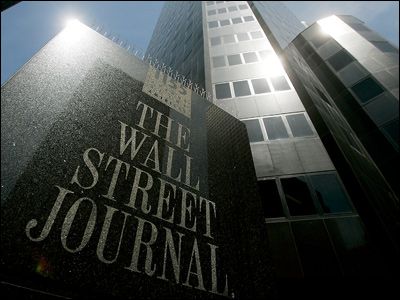Nice Central Bank You Have Here

One of the highest forms of political jiu-jitsu is to accuse your opponents of exactly the same offense that you yourself then proceed to commit.
If executed properly, the audacious maneuver will stun critics into silence - and overwhelm spectators so impressed by the Parson's sermon against Sabbath-breaking that they won't believe their own eyes if they should glimpse him later in the day knocking back a Sunday afternoon bottle of whisky in the next town's saloon.
Just such an aggressively bold maneuver is the culmination of the Wall Street Journal's Fed-bashing editorial I've been studying here and here. After having revised beyond recognition the financial history of the past decade, the Journal editors build to this climax:
The U.S. also needs a debate over the Fed's political independence. In our view, that independence has been compromised over the last 15 years as Messrs. Greenspan and Bernanke allowed themselves to get too close to the White House and Treasury. The Fed's post-crisis interventions have put the central bank in the middle of decisions about fiscal policy and the allocation of credit. Mr. Bernanke sometimes seems to be a veritable arm of the Treasury, reinforcing its fiscal and regulatory agendas at every opportunity.
...
Merely by raising the Fed as a subject, Mr. Perry has sent a political signal to the folks at the Eccles Building to tread carefully as they conduct monetary policy in the coming months. This alone is a public service
See: the problem is that the Fed is not independent enough. The solution? Have a candidate for president issue personal threats against the Fed chairman! What better way to vindicate the independence of the monetary authorities than to "treat 'em ugly" unless they "tread carefully" between now and election day?
This description of Perry's snarling version of a "public service" comes all the more incredibly when you consider this:
The central bank has been in the midst of decisions about fiscal policy for approximately forever. In 1993, Alan Greenspan offered President Clinton lower interest rates if Clinton would restrain spending to shrink the deficit - a transaction described in many places, but most minutely in Bob Woodward's admiring study of Greenspan, Maestro.
I think many people would regard that offer as a reasonable thing for a central banker to do, but reasonable or not - I don't remember the Journal protesting.
Then in 2001, Alan Greenspan publicly testified in favor of the Bush tax cuts. That too was a central bank decision about fiscal policy. And again, the Journal did not protest.
The Bernanke Fed has not leaned anywhere so far forward on fiscal issues as the Greenspan Fed. One possible reason: the Bernanke Fed has been crippled in its effectiveness by the pocket vetoes of Fed directors by individual Republican senators. We have stumbled through the worst financial crisis since the 1930s with long vacancies at the agency that has the mission to stabilize crises - including a pocket veto of a Nobel prize winner - and if the Journal protested, my search engine cannot find it.
I worked at the Wall Street Journal for three proud years. For most of my life, the Journal has been the newspaper I read first - and with greatest trust. In years past, I always believed I could gain insight from the Journal's point of view, even if I dissented from an ultimate conclusion. But confronting the kind of brutal inversion of reality I've chronicled here, I'm left to wonder: what is left of this once great institution?

